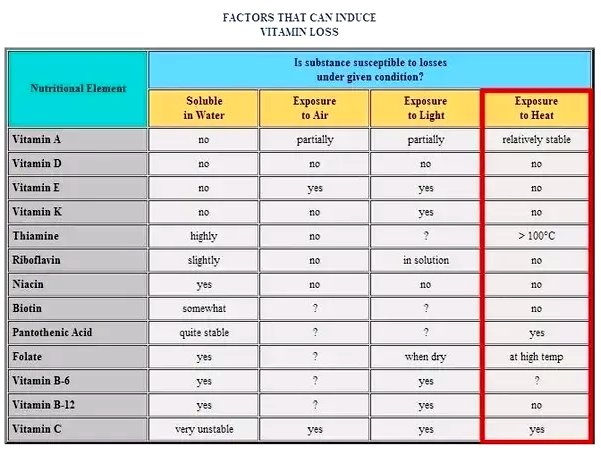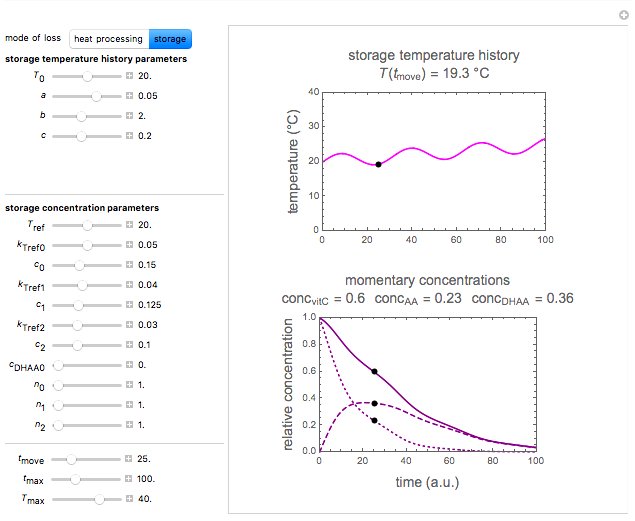Vitamin C, an indispensable nutrient, plays an integral role in maintaining optimal health. Acting as an antioxidant to protect our bodies from dangerous free radicals and increase immunity levels, lack of Vitamin C can result in multiple health issues including scurvy, fatigue and impaired immunity.
Though fruits and vegetables provide healthy doses of vitamin C, one must recognize the factors which reduce its content in food. Oxygen exposure, heat, light, water use and food processing all have the ability to significantly deplete plant-based nutrient levels; vegans especially depend heavily on plant-based nutrition for sustenance.
In this blog post, we aim to investigate the factors that wreak havoc with vitamin C levels, providing insight and vital tips on preserving this essential nutrient. Our comprehensive guide includes pro-tips like limiting oxygen exposure while cooking food at lower temperatures, opting for fresh produce over canned or frozen ones and much more as essential and practical steps for maintaining vitamin C in the diet - no matter if it's your first vegan experience or an experienced pro. Regardless of where you stand in terms of fruit and veggie intake while optimizing overall health!
I. "How Oxygen Exposure Destroys Vitamin C in Food"
Oxygen exposure. Just the word itself strikes fear into fruit and vegetable enthusiasts everywhere, yet what exactly is oxygen exposure and why is it having such an impactful result on our overall health and well-being? Well, the answer lies within Vitamin C; an essential nutrient which supports our bodies to remain at peak performance and keep us feeling our best!
But did you know that chopping or crushing fruits and vegetables causes their vitamin C levels to quickly deplete? Unfortunately, that seemingly harmless process is one of the primary methods for vitamin C to oxidize rapidly and break down without prejudice, leaving more oxygen exposed than before.
As if this wasn't bad enough, when exposed to air for extended periods, fruits and vegetables lose much of their vitamin C content, leading to serious depletion that could threaten overall health!
Preventing Vitamin C Depletion
How can we prevent an all-out vitamin C catastrophe? The solution is easy - reduce oxygen exposure as much as possible by eating freshly cut fruits and vegetables as soon as they're cut, or store them in airtight containers in the fridge with little air exposure (yes, you heard it here first!)
Let's go one step further with carefully chosen antioxidants to maintain the quality of our fruits and vegetables in the refrigerator by slowing the oxidation process. From tart lemon juice to zesty vinegar, these natural preservatives can extend their shelf-life and preserve precious vitamin C content while increasing longevity of fresh cuts!
Even with our best efforts to limit oxygen exposure, vitamin C depletion is inevitable and should be eaten as quickly or stored to minimize loss. Therefore, fruits and vegetables must be consumed within an acceptable window to preserve them as soon as possible or preserved with methods that limit their loss.
Limiting Oxygen Exposure for Optimal Health
Let's join forces in order to limit oxygen exposure's damaging effect on fruits and vegetables. By employing proper storage methods, incorporating antioxidants such as lemon juice or vinegar, and eating foods rich with vitamin C quickly enough we can all ensure we experience our very best health outcomes at all times.
>“Reduce oxygen exposure as much as possible by eating freshly cut fruits and vegetables as soon as they're cut, or store them in airtight containers in the fridge with little air exposure”
Fruits and Vegetables – The Key to Optimal Health
Fruits and vegetables are essential components of a healthy and balanced diet. By reducing oxygen exposure to these crucial foods, we can enjoy their full potential health benefits while preserving their nutrient content for maximum impact.
Conclusion
To sum up, the negative impact of oxygen exposure on vitamin C levels in fruits and vegetables makes proper storage methods and antioxidant preservatives essential to optimize our health. By following these tips and eating these essential foods promptly, we can experience better overall health and well-being.
II. Heat Exposure and Vitamin C Depletion
Heat exposure and its effect on vitamin C depletion is not to be taken lightly, and its breakdown can significantly deplete its content in cooked fruits and vegetables. Therefore, to protect themselves it's crucial not overcooking or overexposing to excessive heat during their preparation process.
Fruits and vegetables stored near high temperatures such as those produced by an oven or stove can become compromised from being exposed to these sources, with vitamin C levels plummeting quickly due to heat exposure. You must proceed carefully in order to protect key nutrition from being depleted when eating these items.
As such, it's of the utmost importance that these foods be consumed either raw or at lower temperatures to minimise heat exposure. Employing methods like stir-frying, steaming or microwaving that limit heat exposure such as stir-frying or microwaving are vital in maintaining optimal vitamin C content in food products such as vegetables. Boiling has been shown to produce up to 50% more vitamin C loss compared to these other methods, thus potentially damaging their vitamin C intake further. Poorly chosen cooking techniques could have far reaching effects for vitamin C intake overall.
Food storage of fruits and vegetables is of equal importance as their preparation. To preserve vitamin C levels, they should not be stored near stoves or ovens as this could deplete their supply; cooler areas like refrigerators are best suitable.
As previously discussed, vitamin C depletion is an extremely serious issue and heat exposure plays an integral part in this depletion process. Therefore, it's critical that fruits and vegetables retain maximum nutritional value by being cooked using low heat exposure techniques and stored appropriately - doing this will protect their vitamin C content as well as maintaining optimal health outcomes.
III. The Effect of Light and Water Content on Vitamin C Preservation
Depletion of vitamin C content in fruits and vegetables is a complex issue influenced by many different factors, but one such element that contributes is light exposure, which has the ability to cause rapid degradation over time. Therefore, to preserve their value of their vitamin C content it's wise to store these items in dark locations such as pantry cabinets or closed cupboards with no direct sunlight; alternatively you could wrap or keep in opaque containers to maintain its integrity.
Water and Vitamin C
Water poses another formidable obstacle when it comes to maintaining vitamin C's abundance, however. Storing fruits and vegetables in water for extended periods can result in significant vitamin C losses; to protect themselves against this damage, pre-rinse them under cold running water is recommended before consumption to eliminate residual dirt or contaminants while providing protection from further vitamin C depletion. When full submersion of foods (for example when prepping meals) may be necessary use as little water as possible to minimize potential vitamin C loss.
Juicing and Vitamin C
People often turn to juice as a healthy way of increasing fruit and vegetable intake, yet many may be unaware that vitamin C degrades rapidly when exposed to water and light, especially store-bought juices that have sat on shelves for extended periods. To maximize vitamin C consumption, crafting your own juice from fresher produce, or producing only smaller batches at one time might be the way forward.
Simple Techniques
As stated previously, there are multiple strategies for maintaining optimal vitamin C levels in fruits and vegetables by taking into account various variables like light exposure and water intake. By adopting simple techniques such as storing produce in dark cupboards, washing them under cold running water and minimizing their water intake you have the power to preserve optimum levels of Vitamin C while making fruits and vegetables an abundant source of healthful nutrition for yourself and others.
>Remember, the key to maintaining vitamin C's nutritional value in fruits and vegetables is by minimizing their exposure to light and water.
SEO tip:
Adding subheadings such as H3, H4, and H5 makes the content easily readable and scanable for both users and search engines. Including a quote block also provides emphasis on the important takeaway message. Additionally, using descriptive and concise language in the paragraphs can also help with SEO optimization.
- Vitamin C is essential for overall health and immunity
- Light exposure has the ability to cause rapid degradation of vitamin C
- Water loss is another major factor in the depletion of vitamin C's value
- Properly storing produce in dark locations and minimizing water intake can preserve its nutritional value
- Juicing fruits and vegetables requires special care to maintain vitamin C levels
- Following these simple techniques can ensure that your body benefits from optimal levels of vitamin C!
IV. Processing and Vitamin C Loss
Processing has an irrefutable detrimental effect on vitamin C levels in food products, making this an issue we cannot neglect. When fruits and vegetables go through the rigorous process of canning or freezing, their vitamin C levels tend to quickly diminish due to high temperatures and extended cooking times that remove their valuable nutritional value - effectively depriving these fruits of their essential vitamin C value.
So to maintain optimal vitamin C levels, those interested in optimizing their levels should opt for fresh fruits and vegetables over processed alternatives. Although fresh produce requires additional work in terms of preparation, its reward far outweighs any inconvenience; fresh produce offers significantly more vitamin C content than its canned or frozen equivalents, as well as being cost-effective, eco-friendly and delicious all at the same time!
But that does not mean processed fruits and vegetables must immediately disappear from our diets; rather it is important to select minimally-processed options without added sugars or preservatives for best nutrition levels. By including fresh produce alongside canned or frozen options in your daily meal plans, vitamin C intake can increase and you will achieve optimal nutrition levels.
To maintain a balanced and nutritionally-sound diet, it is also vital that you maintain an inventory of canned or frozen fruits and vegetables, along with fresh produce that provides essential vitamin C supplements and promotes overall wellbeing. Keeping such supplies on hand ensures a well-rounded and nutritionally sound diet!
Food processing's negative effect on vitamin C levels is of grave concern, so to combat it effectively it's wise to choose fresh fruits and vegetables over processed ones whenever possible, with minimally processed canned or frozen produce providing convenient supplements. Supplementing your diet with an array of nutrient-rich produce is one way of meeting all your dietary requirements and staying on the forefront of health.
Learn more at ods.od.nih.gov about Processing and Vitamin C Loss.Conclusion:
As part of a balanced and healthful diet, it is vital that we understand the many factors that may lead to the destruction of vitamin C in food consumption. These may include exposure to oxygen, heat, light, water and food processing methods. To protect ourselves against such situations and preserve optimal levels of this essential nutrient for body operation. Taking steps like these is key.
One of the best ways to maintain adequate vitamin C levels in our diets is through eating freshly cut and prepared fruits and vegetables, storing them in dark places, selecting cooking methods with less heat exposure, washing under cold running water before ingestion - these measures all can help preserve their vitamin C content. Furthermore, prioritizing fresh produce over canned or frozen varieties while limiting added sugars or preservatives is paramount in providing a healthful vitamin C-rich diet.
Implementing these small yet essential changes can ensure you're receiving enough vitamin C to maintain good health, strong immunity, and overall well-being. Don't allow environmental influences that might deplete vitamin C from food dictate your diet; take charge of your nutrition to maximize intake of this indispensable nutrient to the fullest potential.




